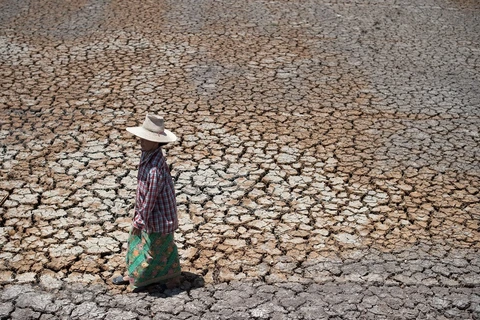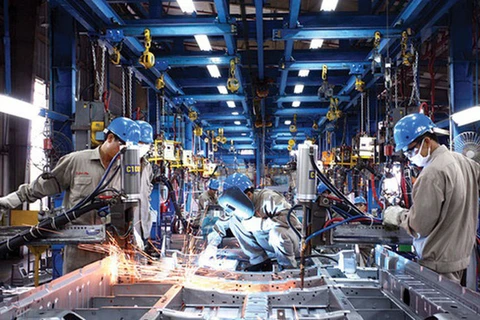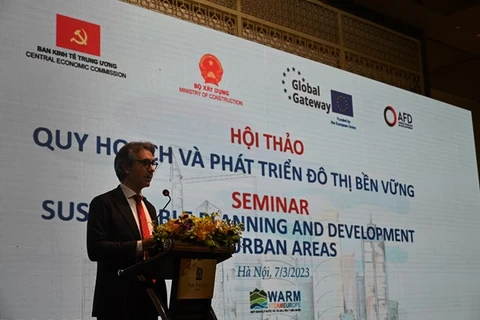Hanoi (VNS/VNA) - A hazard mapping and resilience assessment framework has been introduced in Vietnam to help local developers improve the resilience of buildings.
The Building Resilience Index, an innovation launched by the International Finance Corporation (IFC) in a ceremony held in Hanoi on April 20, will make it easy for developers, locators, homebuyers, and other stakeholders to assess, improve, and disclose the resilience of buildings.
The index evaluates location-specific climate-related risks for real estate projects and resilience measures.
“We welcome IFC’s continued efforts in promoting the sustainable development of the building sector in Vietnam," said Nguyen Cong Thinh, Deputy Director of Science and Technology Department, Ministry of Construction.
"Integrating sustainable and climate-resilient measures in urban development will help ensure a safe and healthy environment for people to live and work in and avoid losses of residential and industrial assets, and at the same time contribute to the country’s combined resilient and net-zero development path.”
With support from the Australian Government, the BRI program in Vietnam has identified and integrated the country’s hazard maps into the BRI app. It will select three pilot projects spanning the residential, office, retail, educational, and hospitality sectors to assess and build resilience.
IFC will also promote the uptake of BRI in the local construction industry by raising awareness and delivering capacity training to building developers and other stakeholders.
Thomas Jacobs, IFC Country Manager for Vietnam, Cambodia and Lao PDR, said: “In the face of threats posed by a rapidly changing climate, it’s vital to ensure that buildings are resilient to natural hazards such as cyclones, flooding, fire and landslides, especially in Vietnam’s urban areas, where so many people live.
“By equipping local developers, investors, and policymakers with the Building Resilience Index, we look forward to helping strengthen the country’s climate agenda, promoting a greener, sustainable, and more inclusive economy."
The BRI initiative was launched in 2020 with the Philippines as the pilot country. Within a year and a half, 1.8 million square metres of gross floor area have been committed to being assessed by BRI for improved climate resilience.
In Vietnam, the BRI program will build on the success of IFC’s green building certification program, Excellence in Design for Greater Efficiencies (EDGE), which has since 2015 helped save 4.1 million USD in utility costs for 77,000 residents, avoiding 30,000 tonnes of greenhouse-gas emissions annually.
Vietnam is among the countries most vulnerable to climate change, having lost about 10 billion USD in 2020 (3.2% of its gross domestic product) to climate impacts. Low-lying and exposed to natural hazards, about 300 coastal urban areas - providing livelihoods for a growing and rapidly urbanising population—especially bear the brunt./.
The Building Resilience Index, an innovation launched by the International Finance Corporation (IFC) in a ceremony held in Hanoi on April 20, will make it easy for developers, locators, homebuyers, and other stakeholders to assess, improve, and disclose the resilience of buildings.
The index evaluates location-specific climate-related risks for real estate projects and resilience measures.
“We welcome IFC’s continued efforts in promoting the sustainable development of the building sector in Vietnam," said Nguyen Cong Thinh, Deputy Director of Science and Technology Department, Ministry of Construction.
"Integrating sustainable and climate-resilient measures in urban development will help ensure a safe and healthy environment for people to live and work in and avoid losses of residential and industrial assets, and at the same time contribute to the country’s combined resilient and net-zero development path.”
With support from the Australian Government, the BRI program in Vietnam has identified and integrated the country’s hazard maps into the BRI app. It will select three pilot projects spanning the residential, office, retail, educational, and hospitality sectors to assess and build resilience.
IFC will also promote the uptake of BRI in the local construction industry by raising awareness and delivering capacity training to building developers and other stakeholders.
Thomas Jacobs, IFC Country Manager for Vietnam, Cambodia and Lao PDR, said: “In the face of threats posed by a rapidly changing climate, it’s vital to ensure that buildings are resilient to natural hazards such as cyclones, flooding, fire and landslides, especially in Vietnam’s urban areas, where so many people live.
“By equipping local developers, investors, and policymakers with the Building Resilience Index, we look forward to helping strengthen the country’s climate agenda, promoting a greener, sustainable, and more inclusive economy."
The BRI initiative was launched in 2020 with the Philippines as the pilot country. Within a year and a half, 1.8 million square metres of gross floor area have been committed to being assessed by BRI for improved climate resilience.
In Vietnam, the BRI program will build on the success of IFC’s green building certification program, Excellence in Design for Greater Efficiencies (EDGE), which has since 2015 helped save 4.1 million USD in utility costs for 77,000 residents, avoiding 30,000 tonnes of greenhouse-gas emissions annually.
Vietnam is among the countries most vulnerable to climate change, having lost about 10 billion USD in 2020 (3.2% of its gross domestic product) to climate impacts. Low-lying and exposed to natural hazards, about 300 coastal urban areas - providing livelihoods for a growing and rapidly urbanising population—especially bear the brunt./.
VNa
























